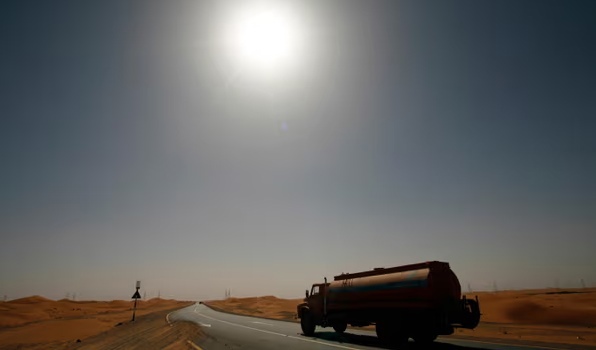Dubai is experiencing a heatwave, with temperatures soaring to 62 C (143.6 Fahrenheit), IntelliNews reports.
While Dubai’s nominal air temperature is not that high – it reached 43C on July 17 – the deadly combination of high humidity and intense air temperatures creates a heat index where the temperature ‘feels’ much higher than the nominal air temperature.
The combination of high humidity and air temperature has caused the heat index to reach dangerous levels, approaching the theoretical limit of human heat tolerance.
The so-called wet-bulb temperature, which exceeds 35 C, is lethal to humans if you stay in it for more than six hours. The wet-bulb temperature is an indicator that takes into account both heat and humidity; when humidity approaches 100 per cent, sweat stops evaporating, preventing the body from cooling, which is fatal if you stay in these conditions for too long.
Meteorologists warn that temperatures in Dubai are approaching the humidity limit, when going outside becomes life-threatening. They attribute such extreme heat to a combination of several factors. Dubai’s geographical location near the Tropic of Cancer plays a role, as does the urban heat island effect, where urban surfaces absorb and retain heat. High humidity levels due to its proximity to the Persian Gulf and global climate change trends are also contributing factors.
Local authorities have issued a warning urging residents and tourists to take precautions against heat-related illnesses. These include drinking water, avoiding outdoor walks during peak heat hours and using air conditioners.
Dubai residents are suffering from a heatwave
US meteorologists highlighted the problem on social media on July 17:
“An air temperature of 109°F and a dew point of 85°F resulted in a heat index of 144°F at Dubai International Airport at 3 p.m.”
Dubai has already suffered extreme weather earlier this year when the annual rainfall rate fell in a single day, causing widespread chaos and flooding.
The extreme heat has also raised concerns about energy consumption, worker safety and the potential impact on tourism in an emirate known for its summer heatwaves.
Earlier this week, energy consumption in the region reached its highest level ever as people switched on air conditioners to offset the effects of the heatwave.
Scientists said that while Dubai and Abu Dhabi regularly experience high temperatures during the summer months, the intensity of this heatwave is in line with global trends of increasing extreme weather events associated with climate change.
On July 16, social media was abuzz with residents complaining about the extreme weather conditions on the r/Dubai Reddit forum.
One user Royo981 wrote:
“I came from the sun, and this heat is unbearable to me.”
Another user, Odd_Wave_8461 responded:
“I’ve lived here all my life, over 3 decades.. and I’m still not accustomed to this heat. It just seems to be getting worse year after year. Global warming is real, folks! Authorities continue to monitor the situation closely, with forecasts suggesting the heatwave may persist in the coming days.”
